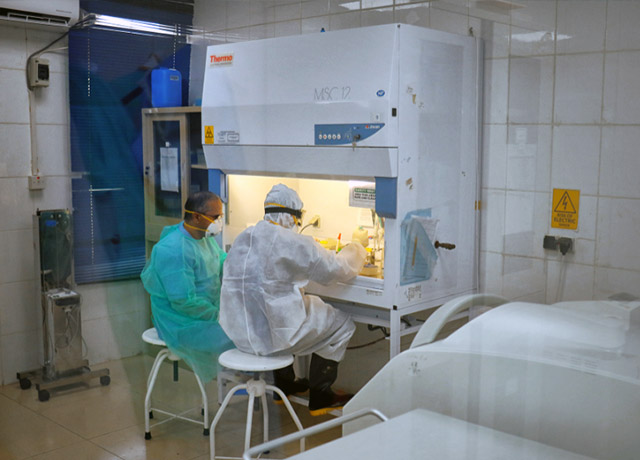Expanded Programme on Immunization
Yemen’s Expanded Programme on Immunization (EPI) uses routine and specialized vaccination campaigns to protect children under one year of age from life-threatening diseases, including diphtheria, cholera and polio. More than 82% of targeted children under 1 year old were reached with various EPI vaccines in 2019. In total over 50 million doses of different vaccine, including oral cholera vaccine administered in 2019 through the EPI, with an average coverage of 80%, during the different campaigns conducted. Supplementary immunization activities are being implemented to mitigate a host of complexities brought on by the ongoing conflict, such as malnutrition, health care access challenges, population movement and changes in the transmission patterns of vaccine-preventable diseases.
With the support of local health authorities, WHO continues to remain vigilant through the disease detection and alert activities carried out by rapid response health teams. These mobile teams work to detect, assess, alert and respond to potential public health threats by investigating the situation and quickly supplying the appropriate public health response to reduce the risk of an outbreak.
Outreach activities update
During December 2019, an integrated outreach round that was the fourth for the year, was conducted in the selected districts/ governorates to vaccinate the target children in the remote areas. A minimum package of “routine essential health and nutrition services provided to the target children and family planning/reproductive health services to women of childbearing age.
The services provided include:
- vaccinations: against 11 childhood vaccine preventable diseases
- Integrated Management of Child Illnesses; treatment of pneumonia, diarrhoea and malaria
- reproductive health; ante/postnatal care and family planning
- nutrition; screening for malnutrition, deworming, micronutrient supplementation
- referral services in case required.
Related links
Update on the Expanded Programme on Immunization, September 2019
Update on the Expanded Programme on Immunization, September 2019
Yemen’s Expanded Programme on Immunization (EPI) uses routine immunization to protect children under one year of age from life-threatening diseases, including diphtheria, cholera and polio.
Supplementary immunization activities are being implemented to mitigate a host of complexities brought on by the ongoing conflict, such as malnutrition, healthcare access challenges, population movements, and changes in the transmission patterns of vaccine-preventable diseases. In the past few months, additional immunization activities have been held to protect people at particular risk of diphtheria and cholera.
With the support of local health authorities, WHO continues to remain vigilant through the disease detection and alert activities carried out by Health Rapid Response Teams. These mobile teams work to detect, assess, alert and respond to potential public health threats by investigating the situation and quickly supplying the appropriate public health response to reduce the risk of an outbreak.
Diphtheria vaccination update: Between 28 July and 5 September, Yemen concluded a diphtheria campaign in 6 governorates. Penta vaccine was administered to 1 215 771 children between the ages of 6 weeks and 5 years. At the same time, 2 190 423 children between the ages of 5 and 15 years received Td (tetanus and diptheria) vaccine. This was the second campaign to protect children from this deadly disease.
Cholera vaccination update: On 14 September, local health authorities along with WHO and UNICEF launched the second round of the oral cholera vaccination (OCV) campaign in 3 districts in the capital of Sana’a deemed at highest risk for cholera. The campaign will last until 23 September. During this house-to-house campaign, 1.4 million doses will be delivered by approximately 1500 mobile teams to families living in the priority areas. An additional 224 teams will work from health centres to serve those who prefer to go to their local health facility to receive OCV. People one year of age should receive OCV.
Polio update: Yemen is considered to be polio-free, and has not seen a case of wild or vaccine-derived polio for several years. All cases of acute flaccid paralysis (AFP) tested from 2018 to 2019 in the country were negative for polioviruses. In Taiz governorate, WHO is currently investigating the cause of 3 cases of paralysis reported in local media, including by taking stool samples and speaking to the families of the children affected to determine their health history. This is routine practice for the poliovirus surveillance system, with hundreds of suspected cases investigated by the polio team in Yemen every year.
In the coming months, WHO will be conducting an EPI review to evaluate the current status of the programme and strengthen existing systems for the purpose of optimizing health service delivery. Immunization, along with a robust and integrated approach focused on disease prevention activities, is a proven means of reducing the burden of vaccine-preventable diseases in Yemen.
Situation reports
 With WHO support, 6 labs are fully functionalwith COVID-19 testing capacityin six governorates;Mukalla, Sayoun, Aden, Hadramout,Taizz, and Sana’a.
With WHO support, 6 labs are fully functionalwith COVID-19 testing capacityin six governorates;Mukalla, Sayoun, Aden, Hadramout,Taizz, and Sana’a.
Updates, October 2020
- Acute malnutrition rates among children under five are the highest ever recorded in parts of Yemen, with more than half a million cases in southern districts.
- New agreements were signed with the Republic of Korea and the Islamic Development Bank, respectively, to support the COVID-19 response in Yemen.
- A total of 204,291 suspected cholera cases and 53 associated deaths were reported during the first ten months of 2020.
- On 4 and 5 October, two UN chartered flights carried back to Sanaa a group of civilian Yemenis who had been receiving medical treatment in Jordan for different diseases and conditions that cannot be treated in Yemen.
Read the latest situation report, October 2020.
2020
Situation report, September 2020
Situation report, February 2020
Situation report, January 2020
2019
Situation report, December 2019
Situation report, November 2019
Situation report, October 2019


